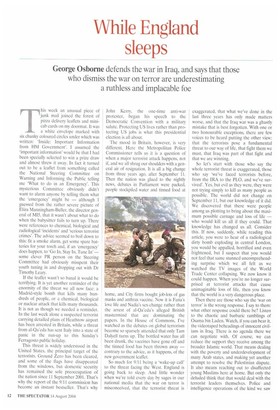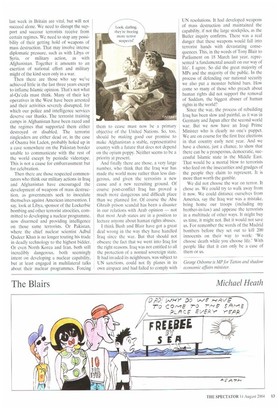While England sleeps
George Osborne defends the war in Iraq, and says that those who dismiss the war on terror are underestimating a ruthless and implacable foe This week an unusual piece of junk mail joined the forest of pizza delivery leaflets and minicab cards on my doormat. It was a white envelope marked with six chunky coloured circles under which was written: 'Inside: Important Information from HM Government'. I assumed the 'important information' would be that I had been specially selected to win a prize draw and almost threw it away. In fact it turned out to be a leaflet from something called the National Steering Committee on Warning and Informing the Public telling me 'What to do in an Emergency'. This mysterious Committee obviously didn't want to alarm anyone by telling them what the 'emergency' might be — although I guessed from the rather severe picture of Eliza Manningham-Buller, the director general of MI5. that it wasn't about what to do when the babysitter fails to turn up. There were references to chemical, biological and radiological 'incidents' and 'serious terrorist crimes'. The advice seemed to boil down to this: fit a smoke alarm, get some spare batteries for your torch and, if an 'emergency' does happen, to 'Go In. Stay In, Tune In' — some clever PR person on the Steering Committee had obviously misspent their youth tuning in and dropping out with Dr Timothy Leary.
If the leaflet wasn't so banal it would be terrifying. It is yet another reminder of the enormity of the threat we all now face: a Madrid-style bomb that kills many hundreds of people, or a chemical, biological or nuclear attack that kills many thousands. It is not as though we needed a reminder. In the last week alone a suspected terrorist carrying detailed plans of Heathrow airport has been arrested in Britain, while a threat from al-Qa'eda has sent Italy into a state of panic in the run-up to this Sunday's Ferragosto public holiday.
This threat is widely understood in the United States, the principal target of the terrorists. Ground Zero has been cleared, and some of the flags have disappeared from the windows, but domestic security has remained the sole preoccupation of the nation since 11 September 2001. That's why the report of the 9/11 commission has become an instant bestseller. That's why John Kerry, the one-time anti-war protester, began his speech to the Democratic Convention with a military salute. Protecting US lives rather than protecting US jobs is what this presidential election is all about.
The mood in Britain, however, is very different. Here the Metropolitan Police Commissioner tells us it is a question of when a major terrorist attack happens, not if, and we all shrug our shoulders with a general air of resignation. It is all a big change from three years ago. after September 11. Then the nation was glued to the nightly news, debates in Parliament were packed, people stockpiled water and tinned food at home, and City firms bought job-lots of gas masks and anthrax vaccine. Now it is Faria's love life and Nadia's sex-change rather than the arrest of al-Qa'eda's alleged British mastermind that are dominating the papers. In the House of Commons, I've watched as the debates on global terrorism become so sparsely attended that only Tam Dalyell turns up. The bottled water has all been drunk, the vaccines have gone off and the tinned food has been thrown away — contrary to the advice, as it happens, of the new government leaflet.
So much for 9/11 being a 'wake-up call' to the threat facing the West. England is going back to sleep. And little wonder when we're told every day by sages in our national media that the war on terror is misconceived, that the terrorist threat is
exaggerated, that what we've done in the last three years has only made matters worse, and that the Iraq war was a ghastly mistake that is best forgotten. With one or two honourable exceptions, there are few voices to be heard putting the other view: that the terrorists pose a fundamental threat to our way of life, that fight them we must, that Iraq was part of that fight and that we are winning.
So let's start with those who say the whole terrorist threat is exaggerated, those who say 'we've faced terrorists before, from the IRA to the PLO, and we've survived'. Yes, but evil as they were, they were not trying simply to kill as many people as possible. The world did not change on September 11, but our knowledge of it did. We discovered that there were people among us plotting to bring about the maximum possible carnage and loss of life — who would kill us all if they could. That knowledge has changed us all. Consider this. If now, suddenly, while reading this article, you were to hear of a radiological dirty bomb exploding in central London, you would be appalled, horrified and even frightened, but I suspect that you would not feel that same stunned uncomprehending surprise which we all felt as we watched the TV images of the World Trade Center collapsing. We now know it could happen. When you're no longer surprised at terrorist attacks that cause unimaginable loss of life, then you know that the world is a very dangerous place.
Then there are those who say the 'war on terror' is the wrong response. I say to them: what other response could there be? Listen to the chaotic and barbaric ramblings of Osama bin Laden. Watch, if you can bear it, the videotaped beheadings of innocent civilians in Iraq. There is no agenda there we can negotiate with. Of course, we can reduce the support they receive among the broader Islamic world. That means dealing with the poverty and underdevelopment of many Arab states, and making yet another attempt to resolve the Palestinian dispute. It also means reaching out to disaffected young Muslims here at home. But only the deluded think that that would deal with the terrorist leaders themselves. Police and intelligence operations of the kind we saw last week in Britain are vital, but will not succeed alone. We need to disrupt the support and succour terrorists receive from certain regimes. We need to stop any possibility of their getting hold of weapons of mass destruction. That may involve intense diplomatic pressure, such as with Libya or Syria, or military action, as with Afghanistan. Together it amounts to an exertion of national effort and military might of the kind seen only in a war.
Then there are those who say we've achieved little in the last three years except to inflame Islamic opinion. That's not what al-Qa'eda must think. Many of their key operatives in the West have been arrested and their activities severely disrupted, for which our police and intelligence services deserve our thanks. The terrorist training camps in Afghanistan have been razed and the regimes that supported them either destroyed or disabled. The terrorist ringleaders are either dead or, in the case of Osama bin Laden, probably holed up in a cave somewhere on the Pakistan border unable to communicate with the rest of the world except by periodic videotape. This is not a cause for embarrassment but for celebration.
Then there are those respected commentators who think our military actions in Iraq and Afghanistan have encouraged the development of weapons of mass destruction, as governments seek to inoculate themselves against American intervention. I say, look at Libya, sponsor of the Lockerbie bombing and other terrorist atrocities, committed to developing a nuclear programme, now disarmed and providing intelligence on those same terrorists. Or Pakistan, where the chief nuclear scientist Adbul Qadeer Khan is no longer touting his trade in deadly technology to the highest bidder. Or even North Korea and Iran, both still incredibly dangerous, both seemingly intent on developing a nuclear capability, but at least engaged in multilateral talks about their nuclear programmes. Forcing them to cease must now be a primary objective of the United Nations. So, too, should be making good our promise to make Afghanistan a stable, representative country with a future that does not depend on the opium poppy. Neither seems to be a priority at present.
And finally there are those, a very large number, who think that the Iraq war has made the world more rather than less dangerous, and given the terrorists a new cause and a new recruiting ground. Of course post-conflict Iraq has proved a much more dangerous and difficult place than we planned for. Of course the Abu Ghraib prison scandal has been a disaster in our relations with Arab opinion — not that most Arab states are in a position to lecture anyone about human rights abuses.
I think Bush and Blair have got a great deal wrong in the way they have handled Iraq since the war. But that should not obscure the fact that we went into Iraq for the right reasons. Iraq was not entitled to all the protection of a normal sovereign state. It had invaded its neighbours. was subject to UN sanctions. could not fly planes in its own airspace and had failed to comply with UN resolutions. It had developed weapons of mass destruction and maintained the capability, if not the large stockpiles, as the Butler inquiry confirms. There was a real danger that these weapons would fall into terrorist hands with devastating consequences. This, in the words of Tony Blair to Parliament on 18 March last year, represented 'a fundamental assault on our way of life'. I agree. So did the great majority of MPs and the majority of the public. In the process of defending our national security we also put a monster behind bars. How come so many of those who preach about human rights did not support the removal of Saddam, the biggest abuser of human rights in the world?
Since the war, the process of rebuilding Iraq has been slow and painful, as it was in Germany and Japan after the second world war. But we now have an Iraqi Prime Minister who is clearly no one's puppet. We are on course for the first free elections in that country early next year. And we have a chance, just a chance, to show that there can be a prosperous, democratic, successful Islamic state in the Middle East. That would be a mortal blow to terrorists who feed on the insecurities and grudges of the people they claim to represent. It is more than worth the gamble.
We did not choose the war on terror. It chose us. We could try to walk away from it now. We could distance ourselves from America, say the Iraq war was a mistake, bring home our troops (including my brother-in-law) and appease the terrorists in a multitude of other ways. It might buy us time, it might not. But it would not save us. For remember the words of the Madrid bombers before they set out to kill 200 innocents on their way to work: 'We choose death while you choose life.' With people like that it can only be a case of them or us.
George Osborne is MP for Tatton and shadow economic affairs minister.



























































 Previous page
Previous page